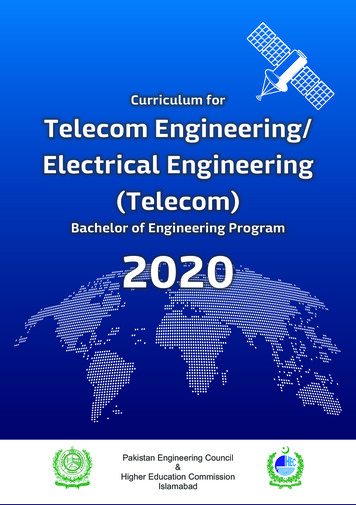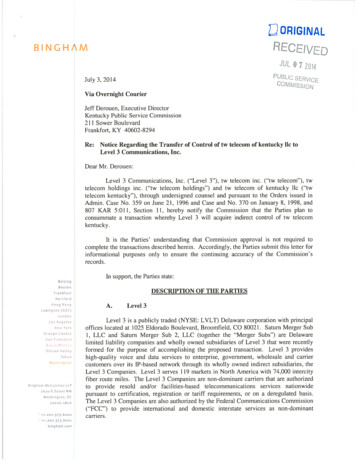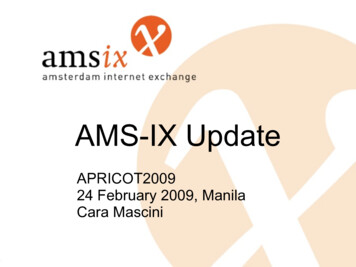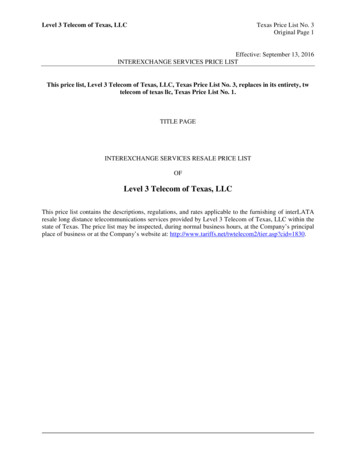
Transcription
Curriculum forTelecom Engineering/Electrical Engineering(Telecom)Bachelor of Engineering Program2020Pakistan Engineering Council&Higher Education CommissionIslamabad
CURRICULUMOFTELECOM ENGINEERING /ELECTRICAL ENGINEERING(TELECOM)Bachelor of Engineering Program2020Pakistan Engineering Council&Higher Education CommissionIslamabad
Curriculum of Telecom Engineering / Electrical Engineering (Telecom)ContentsPREFCE . iii1.Engineering Curriculum Review & Development Committee (ECRDC) . 12.ECRDC Agenda . 23.OBE-Based Curriculum Development Framework . 34.PDCA Approach to Curriculum Development. 45.ECRDC for Electrical & Allied Engineering Disciplines . 55.1 Sub Group Telecom Engineering . 86.Agenda of ECRDC for Electrical and Allied Engineering Disciplines . 107.Program Educational Objectives (PEOs) and Learning Outcomes (PLOs) . 127.1 Program Educational Objectives (PEOs) . 127.2 Program Learning Outcomes (PLOs) . 128.Program Salient Features . 149.Framework for Bachelor of Telecommunication Engineering . 2010. Scheme of Study for Bachelor of Telecommunication Engineering . 2311. Program Specific Labs . 2812. Course Detail and Teaching-Assessment Approaches . 2912.1 Engineering Domain. 2912.2 Non-Engineering Domain . 75ii
Bachelor of Engineering Program (2020)PREFCEThe curriculum, with varying definitions, is said to be a roadmap or plan ofteaching-learning process that students of an academic program are required toundergo. It includes objectives and learning outcomes, course contents, scheme ofstudies, teaching approaches, and assessment methodologies. Since knowledge inall fields and sectors is expanding at a faster pace and new disciplines are alsoemerging; it is imperative that curricula should be dynamic having regular reviewand updation.The University Grants Commission (UGC) was the designated authority todevelop, review and revise curricula beyond Class-XII vide Section 3, Sub-Section2 (ii), Act of Parliament No. X of 1976 titled “Supervision of Curricula andTextbooks and Maintenance of Standard of Education”. With the repeal of UGCAct, the same function was assigned to the Higher Education Commission (HEC)under its Ordinance of 2002, Section 10, Sub-Section 1 (v). In compliance with theabove provisions, the HEC has been undertaking the development of curricula fornew/ emerging fields and revision of curricula after regular intervals throughrespective National Curriculum Revision Committees (NCRCs) until 2018.As a policy change and expanding higher education base under HEC, thecurriculum review and development task has been shifted to the respectiveregulators and HEIs. PEC also having mandate under its Act of Parliament andespecially after attaining Washington Accord full signatory status and IPEAlicensing authority, took up the challenge to review and develop the curricula forengineering programs based on Outcome-Based Education (OBE) System. PEChas therefore constituted an Engineering Curriculum Review and Development(ECRDC) and also subject ECRDCs comprising of eminent engineers andprofessionals from academia and industry to take up the task of curricula reviewand updation. Nevertheless, the basic templates developed by HEC NCRCs havebeen followed as guidelines.Under OBE based curriculum review and development framework, PEC heldnational and regional levels stakeholders and industrial consultation workshopsengaging HEIs, industry, technical and consulting organizations. The experts’feedback and suggestions were translated into the curriculum review process takinginto consideration of the dynamics of technological advancement, industrial needsand management-cum-soft skills for engineering graduates.iii
Curriculum of Telecom Engineering / Electrical Engineering (Telecom)This curriculum document would therefore serve as a guideline whereas allowingHEIs to tame/ change within the framework by introducing courses in support oflocal/ required industrial demand as well as satisfying 12 GAs (GraduateAttributes) covering core and elective courses, considered as beauty of OBE systemin the international environment. At the same time, this curriculum frameworkwould fulfill our national, social and economic needs leading towards attainmentof Sustainable Development Goals (SDGs-2030). It would also provide the level ofcompetency specified in Pakistan Qualification Framework to make it compatiblewith international educational standards.iv
Bachelor of Engineering Program (2020)1. Engineering Curriculum Review & Development Committee(ECRDC)PEC in its efforts towards quality engineering education, took up the challenge ofcurriculum review and development for engineering programs after due consent ofHEC. A high level Engineering Curriculum Review and Development Committee(ECRDC), led by Prof Engr Dr Fazal Ahmad Khalid, Chairman Punjab HEC/ ViceChairman PEC, was constituted whereas other eminent members are from industryand academia to take up the task of curricula review and updation, besidesdeveloping curriculum for new/ emerging fields. The main responsibility ofECRDC is to oversee the entire curriculum review and development process whilesetting policies and guidelines for the subject ECRDCs working in their respectivedomains. The 1st meeting of main ECRDC was held on 29th June, 2018 at PECHQ, Islamabad, wherein the Convener briefed the scope, objective and ToRs of theCommittee and also formulated the subject ECRDCs comprising of eminentengineers and professionals from academia and industry.1.Engr Prof Dr Fazal Ahmed KhalidConvener, Metallurgy, Materials, Mining Engg & AlliedDisciplinesConvener2.Engr Prof Dr M. Younus JavedConvener Electrical Engg & Allied DisciplinesMember3.Engr Malik Saleem Ullah SaeedConvener Chemical Engg & Allied DisciplinesMember4.Engr Dr Wasim KhaliqConvener, Civil Engg & Allied DisciplineMember5.Engr. Prof. Dr. Iftikhar HussainConvener, Mechanical and Allied EngineeringMember6.Engr Dr Muhammad AshrafConvener, Agricultural Engg & Allied DisciplinesMember7.Engr Prof Dr Jameel AhmedConvener, Common to All (Non-Engg Component)Member1
Curriculum of Telecom Engineering / Electrical Engineering (Telecom)8.Engr Muhammad Raza ChohanDirector General, HECMember9.Engr Dr Nasir Mahmood KhanAdditional Registrar (Accreditation), PECMember10. Engr Dr Ashfaq Ahmed SheikhAdditional Registrar, CPDSecretary2. ECRDC Agenda The ECRDC is responsible to oversee the overall working of curriculumreview and development for all engineering programs in terms of strategy,guidance and progress and thereby submission to the relevant forum foradoption/ notification.Each Member of ECRDC will also work in the capacity of Convener forrespective disciplines as mentioned against their names and as per theirToRs.2
Bachelor of Engineering Program (2020)3. OBE-Based Curriculum Development FrameworkOutcome Based Education (OBE) is an approach of teaching and learning thatfocuses on what students should be able to attain at the end of the educationalprogram. OBE is a student’s centered system which concerns what the students willknow and be able to do as learning outcomes. The curriculum development underOBE is therefore an integration of graduate attributes and stakeholders’ feedbackin cognizance with institution’s Vision and Mission.Outcome-Based Education (OBE) - CurriculumDevelopment FrameworkVision & Missionof HEIProgramEducationalObjectives (PEOs)GovernmentFaculty &Support StaffStudentcenteredapproachStakeholdersFacilities &InfrastructureHEIsBenchmarkingInstitutional &Financial culumDesign(course contents,duration, PLOs,delivery &assessmentmechanism, CQIprocess)IT Tools, ArtificialIntelligence, EmergingTechnologies,National Needs(social, political,technological,developmental &economic)SDGs-2030(based on pillars ofSustainable Development(Environment, Social &Economic)3Soft & Life Skills,Entrepreneurship
Curriculum of Telecom Engineering / Electrical Engineering (Telecom)4. PDCA Approach to Curriculum DevelopmentThe process of curriculum design and development constitutes variousinterconnected elements with the objective of achieving the intended purpose of theprogram. The Plan-Do-Check-Act approach (PDCA) as explained below has beenfollowed in the curriculum development and review process.Plan. This stage begins with an analysis of the stakeholders' needs of faculty,current and past students, employers and society in general. The stakeholders' needsare translated into human resource terminology i.e. graduate competencies whichin turn translated into educational taxonomy and learning outcomes. Based on thelearning outcomes, curriculum is designed backward to meet PLOs.4
Bachelor of Engineering Program (2020)Do. The plan stage is implemented where curriculum is delivered and learningoutcomes are assessed to gauge the achievement of PLOs.Check. This stage involves the analysis of assessment results and feedback fromstudents and faculty. Areas for improvement are identified.Act. When the learning outcomes are achieved, the curriculum, learning andteaching strategies and assessment methods are standardized. Best practices areshared and improvement is made for the next cycle of PDCA.5. ECRDC for Electrical & Allied Engineering DisciplinesThe PEC Engineering Curriculum Review and Development Committee (ECRDC)of Electrical and Allied Engineering Disciplines took up the task to review andupdate the curriculum for Bachelor of Telecom Engineering degree program. Thesubject Committee had meetings on 18-9-2019 and 20-2-2020 besides meetingsof Sub-Group Telecom Engineering on 15-11-19 and 5-12-2019 at PECHeadquarters Islamabad. The Committee consisted of following members:1Engr Prof Dr M. Younus JavedVice ChancellorHITEC University, TaxilaConvener2Engr Dr Saeed Ur RehmanExecutive DirectorSir Syed CASE Institute of Technology, IslamabadMember3Engr Zafar MehmoodChief Executive OfficerInterSES (International System Engineering and Services Pvt.Ltd) IslamabadMember4Engr Prof Dr Suhail Aftab QureshiProfessor, Ex DeanUniversity of Engineering & Technology, LahoreMember5
Curriculum of Telecom Engineering / Electrical Engineering (Telecom)5Engr Prof Dr Usman AkramAssociate ProfessorDepartment of Computer & Software EngineeringNUST College of Electrical & Mechanical EngineeringRawalpindiMember6Engr Yasir Rizwan SaqibChief Executive OfficerTechFoot, LahoreMember7Engr Prof Dr Jameel AhmedDeanFaculty of Engineering & Applied SciencesRiphah International University, IslamabadMember8Engr Mairaj GulGeneral Manager Operations NorthNational Telecommunication Corporation, NTC HQs,IslamabadEngr Prof Mansoor ShaukatAssistant ProfessorSchool of Electrical Engineering & Computer Science (SEECS)National University of Sciences and Technology (NUST)IslamabadMember10Engr Prof Dr Bhawani Shankar ChowdhryEx Dean, Faculty of Electrical, Electronics & Computer EnggMehran University of Engg & Technology, JamshoroMember11Engr. Prof. Dr. Mohammad Inayat Ullah BabarVice ChancellorUniversity of Engineering & Technology, TaxilaMember12Engr Prof Dr Madad Ali ShahVice ChancellorThe Benazir Bhutto ShaheedUniversity of Technology and Skill DevelopmentKhairpur Mirs, SindhMember96Member
Bachelor of Engineering Program (2020)13Engr. Muhammad Roshan AwanPrincipalGovt. College of Technology, TaxilaMember14Engr. Habib Ur Rehman QaiserLt. Colonel Army (Rtd), LahoreMember15Dr. Mohammad Ali MaudProfessorDepartment of Computer Engineering UET, LahoreMember16Engr Prof Dr Vali UddinProfessor, Department of ElectronicsHamdard University, KarachiMember17Engr. Prof. Engr Dr. Nisar AhmedProfessorGhulam Ishaq Khan Institute of Engg, Sciences & TechnologySwabiMember18Engr Prof Dr Waqar MahmoodDirectorAl-Khawarizmi Institute of Computer ScienceUET, LahoreMember19Engr Dr Ismail ShahEx-ChairmanPakistan Telecommunication Authority, IslamabadMember20Dr Shazia NaumanAssociate ProfessorRiphah International University, IslamabadMember21Engr Mohsin LatifEntrepreneur, Vital Imaging, KarachiMember22Engr Asif MehmoodDirector NESCOM, IslamabadMember23Engr. Porf Dr. Syed Mohammad Hasan ZaidiSchool of Electrical Engineering and Computer Engineering(SEECS), IslamabadMember7
Curriculum of Telecom Engineering / Electrical Engineering (Telecom)24Engr. Dr. Tauseef TauqeerAssociate ProfessorInformation Technology University, LahoreMember25Engr. Dr. Zahir ParachaProfessor, Department of Electrical EngineeringPakistan Institute of Engineering & Technology, MultanMember26Mr. Hidayatullah KasiDeputy DirectorHigher Education Commission, IslamabadRep HEC27Engr. Dr. Ashfaq Ahmed ShaikhAdditional Registrar-CPDPakistan Engineering Council, IslamabadSecretary28Engr. Muhammad Kashif AliAssistant Registrar-CPDPakistan Engineering Council, IslamabadAR-CPD5.1 Sub Group Telecom Engineering1.Engr. Dr. Syed Mohammad Hasan ZaidiProfessor, NUST School of Electrical Engineeringand Computer Engineering (SEECS), IslamabadLead SubGroup2.Engr. Muhammad Roshan AwanPrincipalGovt. College of Technology, TaxilaMember3.Engr. Habib Ur Rehman QaiserLt. Colonel Army (Rtd)LahoreMember4.Engr Dr Ismail ShahEx-ChairmanPakistan Telecommunication Authority, IslamabadMember5.Engr. Dr. M. ImranDepartment of Electrical EngineeringMilitary College of Signals (MCS), RawalpindiMember8
Bachelor of Engineering Program (2020)6.Engr. Dr. Fasih ud Din ButtDepartment of Electrical EngineeringComsats Islamabad Campus, IslamabadMember7.Engr. Dr. Ali HassanNUST School of Electrical Engineering and ComputerEngineering (SEECS), IslamabadExpert8.Engr. Dr. Danish Ali MazharSenior Instructor TelecomTEVTA, TaxilaExpert9.Mr. Hidayatullah KasiDeputy DirectorHEC, IslamabadRep HEC10. Engr. Dr. Ashfaq Ahmed ShaikhAdditional Registrar-CPDPakistan Engineering Council, IslamabadSecretary11. Engr. Muhammad Kashif AliAssistant Registrar-CPDPakistan Engineering Council, IslamabadAR-CPD9
Curriculum of Telecom Engineering / Electrical Engineering (Telecom)6. Agenda of ECRDC for Electrical and Allied EngineeringDisciplines The Subject ECRDC will work under the overall directions andsupervision of main ECRDC comprising all Conveners.The key driving lines for the development of engineering curriculum foreach discipline will be the overall policy of Pakistan Engineering Councilin connection with international commitments (Washington Accord, IPEAetc.) and Government policies/ HEC.Review of polices and stakeholders’ feedback for the sector(s) relevant tothe respective disciplineComparative study of the curricula being offered at various engineeringuniversities/institutions following the OBE-based systemDevelopment and finalization of complete scheme and curriculum forrespective discipline including all aspects.Engr. Prof. Dr. Muhammad Younis Javed, the Convener highlighted the importantbenchmarks and international best practices to be considered for the revision of thecurriculum while taking into account the Outcome Based Education (OBE) system.He also apprised that the Committee comprising professionals and experts fromacademia, industry and R&D institutions, has provided useful input andsuggestions covering new developments to be incorporated in the curriculum. Healso highlighted the importance of the field of Telecommunication Engineering forachieving sustainable developments while addressing socio-economic issues andchallenges envisaged in Sustainable Development Goals (SDGs) as under and wellmapped with the courses; Goal-1: No Poverty Goal-2: Zero Hunger Goal-3: Good Health and Well-being Goal-4: Quality Education Goal-5: Gender Equality Goal-8: Decent Work and Economic Growth Goal-9: Industrial Innovation and Infrastructure Goal-12: Responsible Consumption and Production10
Bachelor of Engineering Program (2020) Goal-13: Climate ActionThe curriculum therefore has been designed based on above SDGs translating intoprogram objectives and mapped with the scheme of study.11
Curriculum of Telecom Engineering / Electrical Engineering (Telecom)7. Program Educational Objectives (PEOs) and LearningOutcomes (PLOs)As guidance, the sample Program Educational Objectives (PEOs) and LearningOutcomes (PLOs) are given below for a typical Telecom Engineering Program. TheHEIs should have their own program objectives (PEOs) and PLOs in line with theinstitution’s Vision and Mission, in cognizance with industrial needs as well asnational and international trends.7.1 Program Educational Objectives (PEOs)The program aims at imparting quality education to Telecom Engineeringgraduates for contributing to the society through modern technologies andpractices in line with SDGs especially Goal-1, Goal-2, Goal-3, Goal-4,Goal-5, Goal-8, Goal-9, Goal-12, and Goal-13.The graduates of the program will develop into professional engineers who will: Demonstrate excellence in profession through in depth knowledge andskills in the field of Telecommunication EngineeringEngage in continuous professional development and exhibit quest forlearning, innovation and entrepreneurshipShow professional integrity and commitment to social and ethicalresponsibilities7.2 Program Learning Outcomes (PLOs)Program outcomes are the narrower statements that describe what students areexpected to know and be able to do by the time of graduation. These relate to theknowledge, skills and attitude that the students acquire while progressing throughthe program. Specifically, it is to be demonstrated that the students have acquiredthe following graduate attributes (GAs):PLO-01: Engineering Knowledge: Ability to apply knowledge of mathematics,science and engineering fundamentals and an engineering specialization to thesolution of complex engineering problems.PLO-02: Problem Analysis: Ability to identify, formulate, research literature, andanalyze complex engineering problems reaching substantiated conclusions usingfirst principles of mathematics, natural sciences and engineering sciences.12
Bachelor of Engineering Program (2020)PLO-03: Design/Development of Solutions: Ability to design solutions forcomplex engineering problems and design systems, components, or processes thatmeet specified needs with appropriate consideration for public health and safety,cultural, societal, and environmental considerations.PLO-04: Investigation: Ability to investigate complex engineering problems in amethodical way including literature survey, design and conduct of experiments,analysis and interpretation of experimental data, and synthesis of information toderive valid conclusions.PLO-05: Modern Tool Usage: Ability to create, select and apply appropriatetechniques, resources, and modern engineering and IT tools, including predictionand modeling, to complex engineering activities, with an understanding of thelimitations.PLO-06: The Engineer and Society: Ability to apply reasoning informed bycontextual knowledge to assess societal, health, safety, legal and cultural issues andthe consequent responsibilities relevant to professional engineering practice andsolution to complex engineering problems.PLO-07: Environment and Sustainability: Ability to understand the impact ofprofessional engineering solutions in societal and environmental contexts anddemonstrate knowledge of, and need for, sustainable development.PLO-08: Ethics: Apply ethical principles and commit to professional ethics andresponsibilities and norms of engineering practice.PLO-09: Individual and Team Work: Ability to work effectively, as anindividual or in a team, on multifaceted and/or multidisciplinary settings.PLO-10: Communication: Ability to communicate effectively, orally as well asin writing on complex engineering activities with the engineering community andwith society at large, such as being able to comprehend and write effective reportsand design documentations, make effective presentations, and give and receiveclear instructions.PLO-11: Project Management: Ability to demonstrate management skills andapply engineering principles to one’s own work, as a member and/or leader in ateam to manage projects in a multidisciplinary environment.13
Curriculum of Telecom Engineering / Electrical Engineering (Telecom)PLO-12: Lifelong Learning: Ability to recognize importance of, and pursuelifelong learning in the broader context of innovation and technologicaldevelopments.8. Program Salient FeaturesThe undergraduate engineering program has been based on the following salientfeatures: Duration:4 years Number of Semesters:8 Total number of credit hours:130 - 136oEngineering Domain:minimum 85 Credit HoursoNon-Engineering Domain:minimum 30 Credit Hours(HEIs have flexibility of 15-21 Credit Hours to add courses either inEngineering, Non-Engineering or both Domains to fulfill the programobjectives in line with the overall Vision/ Mission of the Instituteconcerned). Additional Course or Credit Hours Requirements: Any addition ofcourse or credit hour requirements as per direction or policy of theGovernment (Provincial or Federal), HEIs have leverage to cater suchneeds over and above the prescribed requirements in this document. Number of weeks per semester:15 - 18 Number of credit hours per semester:15 - 18 Curriculum: The engineering curriculum is the most importantinstrument for grooming the students based on 12 Graduate Attributes(GAs) encompassed under the Program Learning Outcomes (PLOs). Inorder to inculcate different dimensions of thinking – mathematical,computational, design and creative – among students in Cognitive,Psychomotor and Affective domains, the curriculum is based on thefollowing knowledge profiles:WK1 - Natural Sciences: A systematic theory-based understanding ofnatural sciences applicable to the discipline.14
Bachelor of Engineering Program (2020)WK2 - al thinking, numerical analysis, statistics and formalaspects of computer and information science to support analysisand modeling applicable to the discipline.WK3 - Engineering Fundamentals: A systematic, theory-basedformulation of engineering fundamentals required in anengineering discipline.WK4 - Engineering Specialization: The knowledge of engineeringspecialization that provides theoretical frameworks and bodies ofknowledge for the accepted practice areas that are at the forefrontin a discipline.WK5 - Engineering Design: The Design Thinking Knowledge thatsupports engineering design in a practice area of an engineeringdiscipline.WK6 - Engineering Practice: The Knowledge of engineering practices(technology) in different practice areas of an engineeringdiscipline.WK7 - Engineering in Society: A systematic, comprehension-basedknowledge of the role of engineers in a society and theprofessional issues related to practicing engineering professionin a discipline: ethics and the professional responsibility of anengineer to public safety including the impact of an engineeringactivity i.e. economic, social, cultural, and environmental andsustainabilityWK8 - Research Literature: Engagement with selected knowledge inthe research literature of the discipline.The curriculum matrix covering above knowledge profiles shouldtherefore be composed of non-engineering domain (humanities, math,management and natural sciences), and engineering domain withcomputer science, foundation, breadth, depth and multidisciplinarycourses (including safety) so that different streams could be encouragedwithin each discipline, enabling students to undertake a range of ComplexProblem Solving and Complex Engineering Activities. The students15
Curriculum of Telecom Engineering / Electrical Engineering (Telecom)may select electives from any of the streams with guidelines from theirrespective advisors.KnowledgeProfile*(WK-1 -Engineering DomainWK-2Natural ScienceWK-1MathAs per program requirementsPhysicsApplied PhysicsChemistryApplied Chemistry12 - 156-9Natural Science/As per program requirementsMath ncesWritten, communication andpresentation skills4-7Islamic Studies and Ethics2Pakistan Studies and GlobalPerspective2Social ScienceSocial and soft skills2-6ProfessionalPracticeProfessional and ProjectManagement2-6Total (Non-Engineering Domain)min 30Engineering oundation EnggCoursesSpecific to program objectives andoutcomes22 - 24WK-4/WK-2/WK-1Core Breadth ofEngg disciplineSpecific to program objectives andoutcomes23 - 24ICT/AI/ DataScience/ CyberSecurity6-916
Bachelor of Engineering Program (2020)WK-5/WK-6Core Depth ofEngg DisciplineSpecific to program objectives andoutcomes22 - 24WK-1/WK-2/WK-3/WK-4MultidisciplinaryEngg CoursesSpecific to program objectives andoutcomes6 - 12WK-6/WK-8/WK-7Final YearDesign Project(FYDP/CapstoneIntegration of innovative, creative, technical,management and presentation skills of a graduatetowards final year.WK-6/WK-7IndustrialTrainingat least 6 - 8 weeks internshipOccupational Health and Safety(mandatory – 01 Cr Hr)6QualifyingInnovative and Critical Thinking (under relevant courses):- Complex Problem Solving- Complex Engineering Activities- Semester Project- Case Studies- Open Ended Labs- Problem Based Learning (PBL)WK-4/WK-5/WK-6/WK-7/WK-8/WK-2Total (Engineering domain)min 85Total (Credit Hours)130 - 136* As a specific or more than one knowledge profile to be covered. Industrial Training: Internship of at least 6 - 8 weeks is mandatory partof degree requirements towards 3rd to 4th year of program; must besupervised, monitored, evaluated, and reflected in the transcripts under aprescribed mechanism and with defined and mapped rubrics with programobjectives;o Selection of internship in line with elective subjects/ specific streamsoQualifying weightage:70% At least 75% attendance is mandatory10% Assessment report from the employer50% Evaluation at relevant HEIs/ Deptt – presentation40%17
Curriculum of Telecom Engineering / Electrical Engineering (Telecom) Final Year Design Project (FYDP)/ Capstone: FYDP aims to challengeinnovative, creative, technical, management and presentation skills of agraduate to bring together the learning over the degree program.oooo A final year design project (FYDP) is the confluence of anengineering program. Undertaking a final year design project is acompulsory requirement. It should mainly comprise literature search,individual analysis, modeling and simulation, AI (ArtificialIntelligence) and computational data analytics, design and puttingtogether various hardware, software, firmware and AlgorithmEngineering / Informatics related to the program to demonstrate afunctional concept including rapid prototyping, where applicable.The FYDP shall include complex engineering problems and designsystems, components or processes integrating core areas and meetingspecific needs with appropriate consideration for public health andsafety, cultural, societal, and environmental considerations.A project of this nature should invariably lead to an integration of theknowledge and practical skills as mandated in the program outcomes.In this context, projects of multidisciplinary nature should beencouraged.The FYDP should span over two consecutive semesters, i.e. semester7 & 8, totaling 6-credit hours and should be fully supervised, assessedand reflected in the transcripts under a prescribed mechanism so as toprepare for joining industry after graduation.Faculty: The faculty must be trained for the Outcome-Based Education(OBE) system. Their familiarity with the program objectives andoutcomes, understanding of the Outcome-Based Assessment (OBA)cycle, enthusiasm for developing an effective program, and the ability tobecome an active player in this regard are the keys to ensure the attainmentof program objectives. The faculty is expected to have the ability to ensureproper implementation of the program, and to develop processes forevaluation, assessment and CQI. A formal training program to groom thefaculty should be instituted to become effective instructors in applyingpedagogical skills in all aspects of Teaching, Learning and Assessmentcovering all domains of Knowledge, Skills and Attitude.18
Bachelor of Engineering Program (2020) Personal Grooming: Personal Grooming of young faculty members andstudents is very important in order to develop and support theirprofessional skills. Therefore, it is required that HEIs shouldconduct/arrange sessions or counseling hours on regular basis to provideguidance for personal grooming. Personal Grooming is important forpositive self-image and increasing the confidence level of the individuals.It would help in enhancing students’ self-esteem and would go a long wayin developing an attractive personality by adopting habits like personalhygiene, clothing, appearance, interaction and expressive skills, etc. Thestudents should be motivated and equipped to be entrepreneurs in theirrelevant field.Presentation and Communication Skills: Special focus should be givento inculcate communication and presentation skills amongst the graduatesthrough individual and group presentations, technical writing anddiscussions, throughout the program as a regular feature.This cur
Curriculum of Telecom Engineering / Electrical Engineering (Telecom) 8 24 Engr. Dr. Tauseef Tauqeer Associate Professor Information Technology University, Lahore Member 25 Engr. Dr. Zahir Paracha Professor, Department of Electrical Engineering Pakistan Institute of Engineering & Technology, Multan Member 26 Mr. Hidayatullah Kasi Deputy Director










